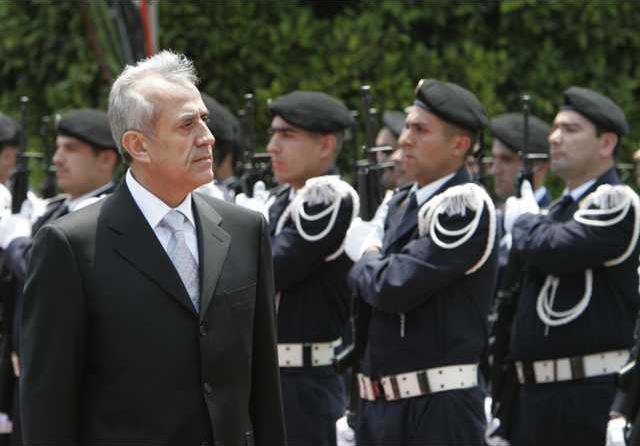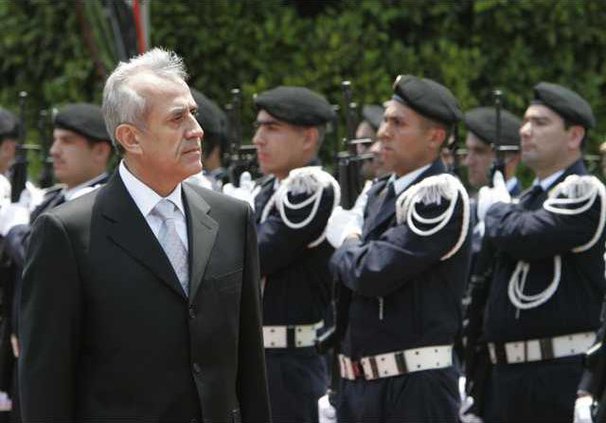BEIRUT, Lebanon — Lebanon’s new president got a red carpet welcome Monday, but was quickly thrust into the political thicket as Hezbollah’s leader warned against any efforts to disarm his Iranian-backed guerrilla group.
Sheik Hassan Nasrallah delivered his stern message after military bands and an honor guard saluted President Michel Suleiman on his first day on the job.
Suleiman, the former army commander, was a consensus candidate agreed on by both Hezbollah and its pro-Western political foes, but he drew pointed comments from Nasrallah after saying in his inauguration speech Sunday that there should be a dialogue over Hezbollah’s arsenal.
The Shiite militant group has rejected demands it disarm, insisting its weapons are needed to protect Lebanon from Israel.
Nasrallah’s speech was his first since Hezbollah fighters seized several areas of Muslim west Beirut in several days of fighting this month, forcing the Western-backed Cabinet to agree to a political deal designed to give Hezbollah and its allies a veto over government policies.
The Hezbollah leader pledged to comply with a provision of the Arab League-brokered agreement that forbids the use of arms to achieve political gains. But he warned that the government shouldn’t try to use the military against Hezbollah and its allies.
‘‘The resistance weapons should not be used to achieve political gains,’’ Nasrallah told tens of thousands of supporters crowding a playground in south Beirut, speaking by videolink from a hiding place in fear of assassination by Israel.
At the same time, he said, ‘‘the state’s weapons should not be used to settle accounts with an opposition political party, or in favor of outside parties that weaken Lebanon’s strength and immunity in confronting Israel.’’
Pro-Western political groups, which hold a small majority in parliament, have repeatedly called for a defense arrangement that would eventually integrate Hezbollah’s fighters and weapons into the national army.
Hezbollah rejects the idea and also balks at observing a requirement that it disarm included in the U.N. Security Council resolution that ended a monthlong war between Israel and the militant group in 2006.
Suleiman said Sunday that he supports the U.N. and its resolutions, although he did not specifically mention the requirement for Hezbollah to disarm. However, he said it was necessary to discuss the future of the group’s arsenal.
Nasrallah said Hezbollah strongly supported the agreement signed by Lebanon’s rival factions in the Qatari capital of Doha, which will give his Syrian-backed bloc veto power in a new Cabinet. The parliamentary majority had staunchly rejected that power for Hezbollah during 18 months of political stalemate, but gave in after the fighting.
Hezbollah’s leader did not gloat over the political victory, saying the country’s factions must work together.
‘‘The national unity government is not a victory against this majority,’’ he said. ‘‘This country cannot rise and continue except through cooperation, consensus and solidarity.’’
But a gunbattle in downtown Beirut late Monday underlined the continued tensions, despite an outburst of relief over the political deal. Security officials said supporters of Hezbollah and of the pro-Western government trade shots, leaving nine people wounded.
Nasrallah’s speech came a day after Suleiman was elected by parliament and sworn in. His election was the first tangible step in the deal to end the long-running political crisis, which escalated this month into the worst violence since Lebanon’s 1975-90 civil war.
Suleiman set to work immediately Monday, scheduling consultations with lawmakers on Wednesday to begin forming the new national unity government, his office said.
Paying a visit to Lebanon, Iranian Foreign Minister Manouchehr Mottaki praised the deal that ended Lebanon’s crisis, saying that ‘‘the implementation of the agreement guarantees calm and stability in the region.’’
Iran is one of Hezbollah’s strongest backers, and the U.S. has accused the Islamic state of interfering in Lebanon’s internal affairs. Mottaki said Iran’s role in Lebanon is ‘‘transparent’’ and insisted Washington is the one who is meddling.
He said Washington’s standing in the region ‘‘has been greatly weakened,’’ an apparent reference to the Hezbollah-led opposition gaining the upper hand in Lebanon and veto power in the next government. The U.S. considers Hezbollah a terrorist organization.
Nasrallah praised Suleiman’s inauguration speech and thanked Syria, Iran and other countries for helping to broker the Doha agreement.
Responding to critics from the parliamentary majority who accused Hezbollah of staging a coup this month to rule Lebanon, Nasrallah said his group was not interested in seizing power in this multisectarian nation of 4 million people.
‘‘We don’t want power. We don’t want to govern Lebanon or impose anything on the Lebanese people because we believe that Lebanon is an exceptional, diverse nation,’’ he said.
Nasrallah was marking the anniversary of Israel’s withdrawal from southern Lebanon in 2000 after an 18-year occupation of a border zone.
The crowd waved yellow Hezbollah flags, and celebratory gunfire reverberated in Beirut and around the city’s southern suburbs before and after Nasrallah spoke.
Nasrallah predicted Israel will release Lebanese prisoners ‘‘very soon,’’ signaling that a prisoner swap for two Israeli soldiers held by Hezbollah since 2006 might be imminent.
Sheik Hassan Nasrallah delivered his stern message after military bands and an honor guard saluted President Michel Suleiman on his first day on the job.
Suleiman, the former army commander, was a consensus candidate agreed on by both Hezbollah and its pro-Western political foes, but he drew pointed comments from Nasrallah after saying in his inauguration speech Sunday that there should be a dialogue over Hezbollah’s arsenal.
The Shiite militant group has rejected demands it disarm, insisting its weapons are needed to protect Lebanon from Israel.
Nasrallah’s speech was his first since Hezbollah fighters seized several areas of Muslim west Beirut in several days of fighting this month, forcing the Western-backed Cabinet to agree to a political deal designed to give Hezbollah and its allies a veto over government policies.
The Hezbollah leader pledged to comply with a provision of the Arab League-brokered agreement that forbids the use of arms to achieve political gains. But he warned that the government shouldn’t try to use the military against Hezbollah and its allies.
‘‘The resistance weapons should not be used to achieve political gains,’’ Nasrallah told tens of thousands of supporters crowding a playground in south Beirut, speaking by videolink from a hiding place in fear of assassination by Israel.
At the same time, he said, ‘‘the state’s weapons should not be used to settle accounts with an opposition political party, or in favor of outside parties that weaken Lebanon’s strength and immunity in confronting Israel.’’
Pro-Western political groups, which hold a small majority in parliament, have repeatedly called for a defense arrangement that would eventually integrate Hezbollah’s fighters and weapons into the national army.
Hezbollah rejects the idea and also balks at observing a requirement that it disarm included in the U.N. Security Council resolution that ended a monthlong war between Israel and the militant group in 2006.
Suleiman said Sunday that he supports the U.N. and its resolutions, although he did not specifically mention the requirement for Hezbollah to disarm. However, he said it was necessary to discuss the future of the group’s arsenal.
Nasrallah said Hezbollah strongly supported the agreement signed by Lebanon’s rival factions in the Qatari capital of Doha, which will give his Syrian-backed bloc veto power in a new Cabinet. The parliamentary majority had staunchly rejected that power for Hezbollah during 18 months of political stalemate, but gave in after the fighting.
Hezbollah’s leader did not gloat over the political victory, saying the country’s factions must work together.
‘‘The national unity government is not a victory against this majority,’’ he said. ‘‘This country cannot rise and continue except through cooperation, consensus and solidarity.’’
But a gunbattle in downtown Beirut late Monday underlined the continued tensions, despite an outburst of relief over the political deal. Security officials said supporters of Hezbollah and of the pro-Western government trade shots, leaving nine people wounded.
Nasrallah’s speech came a day after Suleiman was elected by parliament and sworn in. His election was the first tangible step in the deal to end the long-running political crisis, which escalated this month into the worst violence since Lebanon’s 1975-90 civil war.
Suleiman set to work immediately Monday, scheduling consultations with lawmakers on Wednesday to begin forming the new national unity government, his office said.
Paying a visit to Lebanon, Iranian Foreign Minister Manouchehr Mottaki praised the deal that ended Lebanon’s crisis, saying that ‘‘the implementation of the agreement guarantees calm and stability in the region.’’
Iran is one of Hezbollah’s strongest backers, and the U.S. has accused the Islamic state of interfering in Lebanon’s internal affairs. Mottaki said Iran’s role in Lebanon is ‘‘transparent’’ and insisted Washington is the one who is meddling.
He said Washington’s standing in the region ‘‘has been greatly weakened,’’ an apparent reference to the Hezbollah-led opposition gaining the upper hand in Lebanon and veto power in the next government. The U.S. considers Hezbollah a terrorist organization.
Nasrallah praised Suleiman’s inauguration speech and thanked Syria, Iran and other countries for helping to broker the Doha agreement.
Responding to critics from the parliamentary majority who accused Hezbollah of staging a coup this month to rule Lebanon, Nasrallah said his group was not interested in seizing power in this multisectarian nation of 4 million people.
‘‘We don’t want power. We don’t want to govern Lebanon or impose anything on the Lebanese people because we believe that Lebanon is an exceptional, diverse nation,’’ he said.
Nasrallah was marking the anniversary of Israel’s withdrawal from southern Lebanon in 2000 after an 18-year occupation of a border zone.
The crowd waved yellow Hezbollah flags, and celebratory gunfire reverberated in Beirut and around the city’s southern suburbs before and after Nasrallah spoke.
Nasrallah predicted Israel will release Lebanese prisoners ‘‘very soon,’’ signaling that a prisoner swap for two Israeli soldiers held by Hezbollah since 2006 might be imminent.

